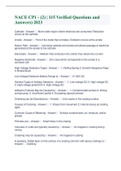Nace cp - Study guides, Class notes & Summaries
Looking for the best study guides, study notes and summaries about Nace cp? On this page you'll find 602 study documents about Nace cp.
Page 3 out of 602 results
Sort by
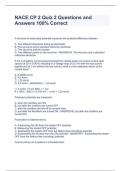
-
NACE CP 2 Quiz 2 Questions and Answers 100% Correct
- Exam (elaborations) • 7 pages • 2024
-
Available in package deal
-
- $10.99
- + learn more
NACE CP 2 Quiz 2 Questions and Answers 100% Correct NACE CP 2 Quiz 2 Questions and Answers 100% Correct NACE CP 2 Quiz 2 Questions and Answers 100% Correct NACE CP 2 Quiz 2 Questions and Answers 100% Correct A structure-to-electrolyte potential measures the potential difference between A. Two different structures acting as electrodes B. The structure and a standard reference electrode C. The structure and the anodes D. Two different points on the structure - ANSWER-B. The s...
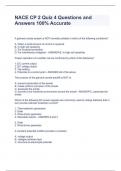
-
NACE CP 2 Quiz 4 Questions and Answers 100% Accurate
- Exam (elaborations) • 7 pages • 2024
-
Available in package deal
-
- $10.99
- + learn more
NACE CP 2 Quiz 4 Questions and Answers 100% Accurate NACE CP 2 Quiz 4 Questions and Answers 100% Accurate NACE CP 2 Quiz 4 Questions and Answers 100% Accurate NACE CP 2 Quiz 4 Questions and Answers 100% Accurate A galvanic anode system is NOT normally suitable in which of the following conditions? A. When a small amount of current is required B. In high soil resistivity C. For localized protection D. For interference mitigation - ANSWER-B. In high soil resistivity Proper o...
NACE CP1 - (2) | 115 Verified Questions and Answers) 2023
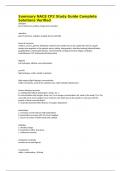
-
Summary NACE CP2 Study Guide Complete Solutions Verified And Graded A+
- Exam (elaborations) • 22 pages • 2024
-
Available in package deal
-
- $11.79
- + learn more
Summary NACE CP2 Study Guide Complete Solutions Verified oxidation loss of electrons, positive charge atoms (anode) reduction gain of electrons, negative charged atoms (cathode) forms of corrosion uniform, crevice, galvanic (dissimilar metals) if two metals have to be couple then best to couple metals close together in the galvanic series, pitting, intergranular, selective leaching (dezincification, graphitization), velocity phenomena, environmental cracking (corrosion fatigue, hyd...
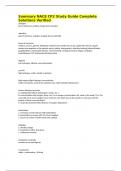
-
Summary NACE CP2 Study Guide Complete Solutions Verified
- Summary • 22 pages • 2024
- Available in package deal
-
- $11.00
- + learn more
Summary NACE CP2 Study Guide Complete Solutions Verified oxidation loss of electrons, positive charge atoms (anode) reduction gain of electrons, negative charged atoms (cathode) forms of corrosion uniform, crevice, galvanic (dissimilar metals) if two metals have to be couple then best to couple metals close together in the galvanic series, pitting, intergranular, selective leaching (dezincification, graphitization), velocity phenomena, environmental cracking (corrosion fatigue, hyd...
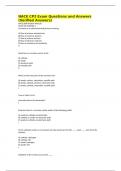
-
NACE CP2 Exam Questions and Answers (Verified Answers) Graded A+!!!
- Exam (elaborations) • 88 pages • 2024
-
Available in package deal
-
- $15.59
- + learn more
NACE CP2 Exam Questions and Answers (Verified Answers) NACE 2008 Student Manual! START OF CHAPTER 1 Corrosion is an electrochemical process involving A) flow of protons and electrons B) flow of neutrons and ions C) flow of protons and ions D) flow of electrons and ions E) flow of resistance and resistivity d Metal loss or corrosion occurs at the A) cathode B) anode C) electronic path D) metallic path b What are the four parts of the corrosion cell A) anode, resisto...
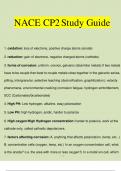
-
NACE CP2 Study Guide
- Exam (elaborations) • 49 pages • 2024
- Available in package deal
-
- $9.99
- + learn more
1. oxidation: loss of electrons, positive charge atoms (anode) 2. reduction: gain of electrons, negative charged atoms (cathode) 3. forms of corrosion: uniform, crevice, galvanic (dissimilar metals) if two metals have to be couple then best to couple metals close together in the galvanic series, pitting, intergranular, selective leaching (dezincification, graphitization), velocity phenomena, environmental cracking (corrosion fatigue, hydrogen embrittlement, SCC (Carbonates/bicarbonates) 4...
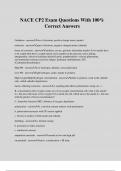
-
NACE CP2 Exam Questions With 100% Correct Answers
- Exam (elaborations) • 29 pages • 2024
-
- $13.49
- + learn more
NACE CP2 Exam Questions With 100% Correct Answers Oxidation - answerloss of electrons, positive charge atoms (anode) reduction - answergain of electrons, negative charged atoms (cathode) forms of corrosion - answeruniform, crevice, galvanic (dissimilar metals) if two metals have to be couple then best to couple metals close together in the galvanic series, pitting, intergranular, selective leaching (dezincification, graphitization), velocity phenomena, environmental cracking (corrosion fa...
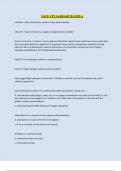
-
NACE CP2 ALREADY RATED A
- Exam (elaborations) • 33 pages • 2024
-
Available in package deal
-
- $9.99
- + learn more
NACE CP2 ALREADY RATED A oxidation loss of electrons, positive charge atoms (anode) reduction gain of electrons, negative charged atoms (cathode) forms of corrosion uniform, crevice, galvanic (dissimilar metals) if two metals have to be couple then best to couple metals close together in the galvanic series, pitting, intergranular, selective leaching (dezincification, graphitization), velocity phenomena, environmental cracking (corrosion fatigue, hydrogen embrittlement, SCC (Carbonat...
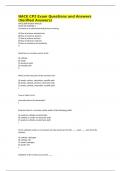
-
NACE CP2 Exam Questions and Answers (Verified Answers)
- Exam (elaborations) • 88 pages • 2024
- Available in package deal
-
- $15.50
- + learn more
NACE CP2 Exam Questions and Answers (Verified Answers) NACE 2008 Student Manual! START OF CHAPTER 1 Corrosion is an electrochemical process involving A) flow of protons and electrons B) flow of neutrons and ions C) flow of protons and ions D) flow of electrons and ions E) flow of resistance and resistivity d Metal loss or corrosion occurs at the A) cathode B) anode C) electronic path D) metallic path b What are the four parts of the corrosion cell A) anode, resisto...

How did he do that? By selling his study resources on Stuvia. Try it yourself! Discover all about earning on Stuvia

